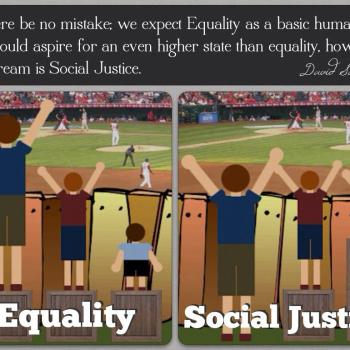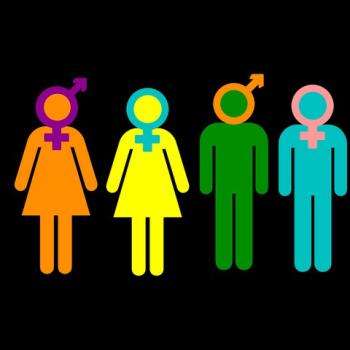Practical Spirituality series
In my youth, I attended and was “saved” in a church. Baptized twice. The big message seemed to be that if you’re imperfect, you’re unacceptable to God. Throughout my youth, I felt unacceptable. Saved but unacceptable. I just couldn’t be perfect and God only accepts perfection. This influenced me to be a perfectionist and intolerant of others.
Or does God accept us warts and all?
(An AI summary is at the end from ChatGPT.)

We’re all children of God.
Later, as a pastor, I realized that if we focus on the Hebrew Bible, the emphasis is on sin and imperfection. If we focus on the message of Jesus, the focus is on being accepted by God. It makes all the difference in the world what we focus on.
Keith Giles, in his post, How Jesus Redefined Holiness, explained this well.
You can’t lose God’s love for something you do wrong, because you didn’t get the love of God for something you did right. God’s love is unearned but ever-present. God loves everyone all over the world, regardless of our faults. Our goal is to become better people. That means we are less than perfect, but learning.
We don’t dispose of our children because they are not perfect. Eh, sometimes we may think about it, but love intervenes. We tolerate them, try to guide them, and smile as we watch them grow into adults with adult mindsets with a moral compass, responsibility, and accountability.
We shouldn’t think in terms of perfect. I’m not sure if we can ever reach that goal. We should think in terms of developing. Endless development. The spiritual kingdom of God that we’re in isn’t a museum of perfect saints. It’s us with all our deficits.
The effect of focus
The things we focus on determine our path in life. Some paths are destructive and some are constructive.
A laser-focus on eradicating “sin” in our lives becomes an endless search for sin and a preoccupation with it – this type of focus is idolatrous. It’s a destructive focus that places hate of sin above the love of God. It’s a man-made focus.
Hating sin is what the church of Ephesus, mentioned in Revelation 2:1–7, was doing. Jesus Christ praised the church for its work, perseverance, and church discipline. However, he also admonishes the church for forsaking its first love because of its laser-focus on hating sin.
Some self-proclaimed judges believe shaming others is doing God’s work. They don’t realize that the Spirit of God is the one who enlightens people to understand that their behavior is harming others and compassionately guides them to correct it.
It’s not the hammer of guilt and shame at work, it’s the work of God’s love in the person’s life. God loves us and helps us to overcome our behavior. If God didn’t love us, God would just ignore our behavior until we destroy others and ourselves. God loves us. God tolerates our incorrect behavior while we grow. It’s spiritual growth.
Feeling unworthy, unacceptable, and unlovable drives people away and destroys them. Today we recognize making others feel this way is abuse. See Am I Unlovable? And The Psychology of Shame. While people may accept guilt for their behavior and change it, in contrast shame is a path to destruction.
Focus on acceptance, love, and forgiveness
Jesus’ focus was on acceptance. Rather than shun people as unacceptable, as the Jews did at that time, Jesus went to those who were sick, tax collectors, Roman soldiers, those in other religions or outside of Judaism … all those who the Jews hated and shunned. Those people already knew what they were doing wrong, if they even were doing wrong. Jesus said to them they’re forgiven and to sin no more.
The path that Jesus showed us is essential for all relationships. When others know you feel remorse for the way you’ve treated them, that’s a major step in reconciling your relationship. We may not like others’ treatment of us, but we accept them and want to go forward in the relationship. We don’t bring the subject up again. A hug, handshake, smile, or other form of acceptance brings healing. Healed relationships are stronger than ones that encounter no turmoil.
The University of Kansas sees forgiveness and reconciliation as community building: Community Tool Box. Strong communities have a major impact on individuals.
The effect of acceptance and reconciliation in our lives is a force that changes us from less able to more able. We’re empowered in our lives.
Empowerment
Does God and our improved relationships empower us? On a very practical level it can help bring us into contact with others who can help us accomplish more. Synergy, effective leadership, and cooperative efforts, are all hallmarks of good relationships.
The word “empower” doesn’t occur in the Bible in exactly that meaning. It means “to give power or authority to.” Since the 1980s we’ve used it as “make (someone) stronger and more confident, especially in controlling their life and claiming their rights.”
The Bible includes these same thoughts:
The ancient Greek word, endunamoó: (ἐνδυναμόω) means to empower, fill with power, strengthen, make strong.
Timothy used this word in 1 Timothy 1: 12-14, highlighting how undeserving he was:
“I thank Christ Jesus our Lord, who has strengthened me, because He considered me faithful, putting me into service, even though I was formerly a blasphemer and a persecutor and a violent aggressor. Yet I was shown mercy because I acted ignorantly in unbelief; and the grace of our Lord was more than abundant, with the faith and love which are found in Christ Jesus.” (NASB)
The Apostle Paul speaks about gaining strength in the face of diversity in Philippians 4: 12-13: “I know how to get along with humble means, and I also know how to live in prosperity; in any and every circumstance I have learned the secret of being filled and going hungry, both of having abundance and suffering need. I can do all things through Him who strengthens me.” (NASB)
According to 2 Timothy 1:7, “For God has not given us a spirit of fear and timidity, but of power, love, and self-discipline”
The Apostle Paul talked about adversity and our power. “And we know that God causes all things to work together for good to those who love God, to those who are called according to His purpose.” And “If God is for us, who is against us?” (Portions from Romans 8: 18-31 (NASB))
Those in Jesus’ time, and without a doubt today, have experienced the power of God in their lives to assist them in accomplishing the tasks they’ve gained.
The Holy Spirit, which is God working within us, also enables us
There’s a joke in the electrical power industry about two crews setting utility poles. One crew set the usual number of poles each day. The other crew was taking three times as long. The foreman went out to inspect and found they were sinking the poles down twenty feet. He asked the supervisor on the job why on earth he would do that. He replied they thought they were building a fence.
When we lack insight, we work hard but not smart. The Spirit of God gives us insight and wisdom. The word for spirit, paraclete, means advocate, counselor, or helper. It’s like thinking we are the means to others’ salvation when that is actually the Spirit of God’s work.
It’s our job to be there to help others when they need help. We often get that just backwards and work ourselves to frustration thinking we’re going to “save” someone. We’re an example to others of God’s love, not their savior.
Moving forward
When I was young I thought as a child. I was quick with a harsh word. Conflict always brought out my sharp tongue. Now I despise myself when I say something that cuts others down or makes my wife feel less than. I hate it when I see pain in others’ eyes and know that I caused it.
It takes around ten positive comments to overcome the effect of one negative one. It’s difficult to take the time to undo negative things. I don’t have time for it. I try to always say accepting and loving things and not make disparaging comments.
We all do a lot of things that are wrong. Labeling them “sin” is a throwback to ancient thinking about nonacceptance and being unlovable. We are people who are developing, and we all need to remember that we’re all children in God’s eyes. God isn’t through guiding us yet and we are not to judge others.
What does God ask of us? Is it to run around declaring others sinful? Is it to show God’s love to others? Is it to grow in peace and happiness? Is it to grow spiritually?
Happiness, or life satisfaction, is the culmination of loving others and developing spiritually.
I believe God is less satisfied with us when we ignore loving others and ignore spiritual growth. It’s like watching the potential your children have, not enrich their lives or the lives of others. It’s frustrating. You want the best for them.
Conclusion
The easy path is for us to go through life criticizing others for what we perceive as their sin, while, as Jesus says, ignoring the board in our own eye. We’re not to judge unless we want judged for our boatload of failures. (Matthew 7: 1-5)
It’s up to the Spirit of God to guide people and help them recognize what they are doing wrong. It’s not our job.
It’s all about focus. We can turn what we think of as sin into something we focus all our time on rectifying, creating an idol to worship. But this isn’t what any of us are supposed to do. Our focus should be on loving others so showing the love of God through Jesus. Hate pushes away. Love attracts.
Jesus is our example of practical spirituality. He said he didn’t come to condemn others, and he didn’t. He came to declare an age of forgiveness and goodwill: Good News. The only people he came close to condemning were the leaders who he called snakes for the false burdens they put on people while enjoying lives of hypocrisy and luxury. We should try emulating Jesus.
Probability Space
For 2000 years, the opportunity has been here for us to think in terms of loving others and ignoring others’ sins. The time is pregnant with not just possibility but probability. Every day is another time to consider whether others’ sins are greater than ours, or should we let God be the judge? Every day is another time to think of new ways to show God’s love to others.
- Dorian
Our answer is God. God’s answer is us. Together we make the world better.
ChatGPT Summary
“Imperfect But Loved: A Practical Spirituality Journey”
In my formative years, I actively participated in a church, underwent salvation, and even experienced baptism twice. However, the overarching message seemed to convey that imperfection rendered one unacceptable to God. Throughout my youth, I grappled with feelings of inadequacy despite being ‘saved.’ This notion that God only accepts perfection inadvertently led me to adopt a perfectionist mindset, making me intolerant of others. But, is God’s acceptance contingent on flawlessness?
Image: Jesus and Children by James Shepard on Flickr
We’re all regarded as children of God, a realization that came later in life. As a pastor, I discerned a shift in emphasis between the Hebrew Bible, fixating on sin and imperfection, and the message of Jesus, centered around acceptance by God. Keith Giles, in his post titled “How Jesus Redefined Holiness,” aptly explained this paradigm shift.
The core assertion is that God’s love is unearned yet ever-present. Regardless of our faults, God loves every individual globally. Our goal, then, is not perfection but rather continuous improvement. Analogously, we don’t discard our imperfect children; instead, we guide them, tolerating their shortcomings as they evolve into responsible adults with a moral compass.
Perfection, the article argues, shouldn’t be the benchmark. Instead, we should adopt a mindset of endless development, understanding that the spiritual kingdom of God is not a museum of perfect saints but a diverse community with all our inherent deficits.
The Impact of Focus: The article delves into the significance of focus, differentiating between destructive and constructive paths. A laser focus on eradicating sin is likened to an idolatrous pursuit that places hate of sin above the love of God.
Acceptance and Reconciliation: Drawing on biblical and practical examples, the article advocates for a shift from hating sin to embracing acceptance, love, and forgiveness. Jesus’ focus on acceptance is highlighted, citing instances where he reached out to those shunned by society.
Empowerment: The concept of empowerment, not explicitly mentioned in the Bible, is explored in terms of giving power and authority. The article draws on biblical references to underscore the idea of being empowered by God.
Moving Forward: The article transitions into a personal reflection on growth, acknowledging past mistakes and the effort required to undo negativity. The importance of focusing on love, spiritual growth, and the understanding that everyone is a child in God’s eyes is emphasized.
Conclusion: The conclusion emphasizes the perilous path of criticizing others for perceived sins while neglecting personal shortcomings. The role of the Spirit of God in guiding people is emphasized, steering away from judgment.
In essence, the article encourages a shift in focus from condemning others to embodying Jesus’ example of love, forgiveness, and goodwill. It contends that embracing love attracts, whereas hate repels.
Probability Space: The article concludes by inviting readers to consider the opportunity, spanning 2000 years, to prioritize love over judgment. Each day is presented as a chance to ponder whether others’ sins outweigh our own and whether we should let God be the ultimate judge.
Overall, “Imperfect But Loved” provides a thoughtful exploration of spirituality, urging readers to embrace acceptance, love, and continuous personal development, inspired by the teachings of Jesus.













